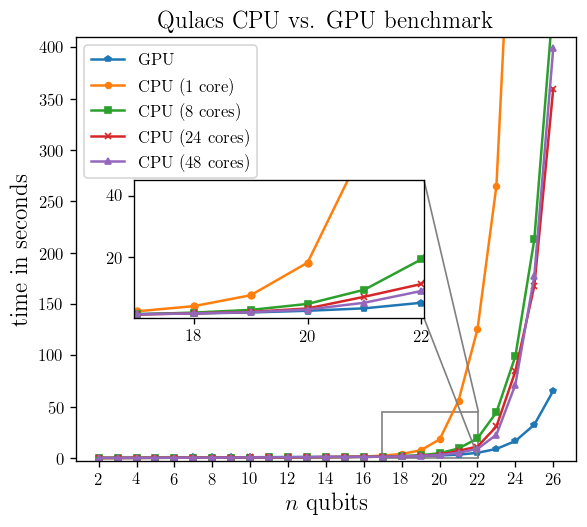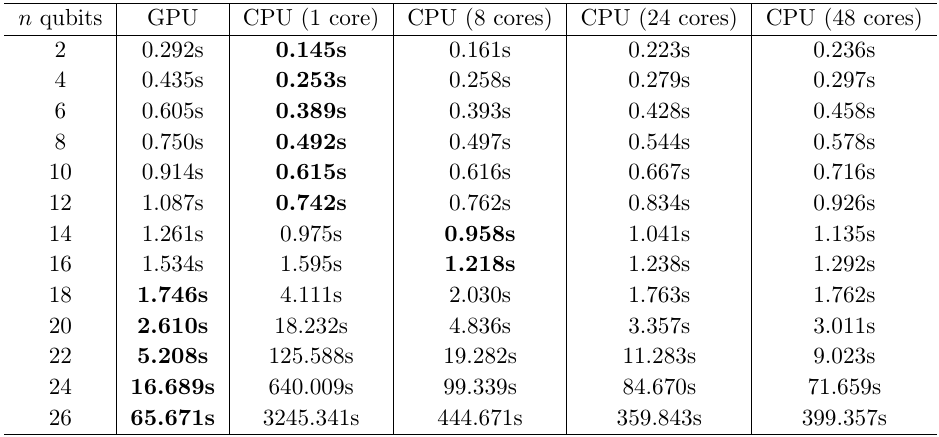The PennyLane-Qulacs plugin integrates the Qulacs quantum computing framework with PennyLane's quantum machine learning capabilities.
PennyLane is a cross-platform Python library for quantum machine learning, automatic differentiation, and optimization of hybrid quantum-classical computations.
Qulacs is a software library for quantum computing, written in C++ and with GPU support.
The plugin documentation can be found here: https://docs.pennylane.ai/projects/qulacs.
- Provides access to Qulacs' simulator backend via the
qulacs.simulatordevice - Support for all PennyLane core functionality
We ran a 100 executions of 4 layer quantum neural network strongly entangling layer and compared the runtimes between CPU and GPU.
This plugin requires Python version 3.6 or above, as well as PennyLane and Qulacs. Installation of this plugin, as well as all dependencies, can be done using pip:
$ pip install pennylane-qulacs["cpu"]Note that you need to include whether to install the CPU version (pennylane-qulacs["cpu"]) or the GPU version (pennylane-qulacs["gpu"]) of Qulacs for it to be installed correctly. Otherwise Qulacs will need to be installed independently:
pip install qulacs pennylane-qulacsAlternatively, you can install PennyLane-Qulacs from the source code by navigating to the top directory and running:
$ python setup.py installNote
Qulacs supports parallelized executions via OpenMP. To set the number of threads to use during simulations you need to update the environment variable OMP_NUM_THREADS. It can be set using the UNIX command:
export OMP_NUM_THREADS = 8
where 8 can be replaced by the number of threads that you wish to use. By default Qulacs uses all available threads. To restore the default behaviour, simply remove the environment variable. It can be done using the UNIX command:
unset OMP_NUM_THREADS
See the OpenMP documentation page for OMP_NUM_THREADS or here for more details on how to use environment variables.
PennyLane-Qulacs requires the following libraries be installed:
- Python >= 3.6
as well as the following Python packages:
If you currently do not have Python 3 installed, we recommend Anaconda for Python 3, a distributed version of Python packaged for scientific computation.
To test that the PennyLane-Qulacs plugin is working correctly you can run
$ make testin the source folder.
To build the HTML documentation, go to the top-level directory and run:
$ make docsThe documentation can then be found in the doc/_build/html/ directory.
We welcome contributions - simply fork the repository of this plugin, and then make a pull request containing your contribution. All contributers to this plugin will be listed as authors on the releases.
We also encourage bug reports, suggestions for new features and enhancements, and even links to cool projects or applications built on PennyLane.
PennyLane-Qulacs is the work of many contributors.
If you are doing research using PennyLane and PennyLane-Qulacs, please cite our paper:
Ville Bergholm, Josh Izaac, Maria Schuld, Christian Gogolin, M. Sohaib Alam, Shahnawaz Ahmed, Juan Miguel Arrazola, Carsten Blank, Alain Delgado, Soran Jahangiri, Keri McKiernan, Johannes Jakob Meyer, Zeyue Niu, Antal Száva, and Nathan Killoran. PennyLane: Automatic differentiation of hybrid quantum-classical computations. 2018. arXiv:1811.04968
- Source Code: https://github.com/PennyLaneAI/pennylane-qulacs
- Issue Tracker: https://github.com/PennyLaneAI/pennylane-qulacs/issues
- PennyLane Forum: https://discuss.pennylane.ai
If you are having issues, please let us know by posting the issue on our Github issue tracker, or by asking a question in the forum.
The PennyLane-Qulacs plugin is free and open source, released under the Apache License, Version 2.0.





